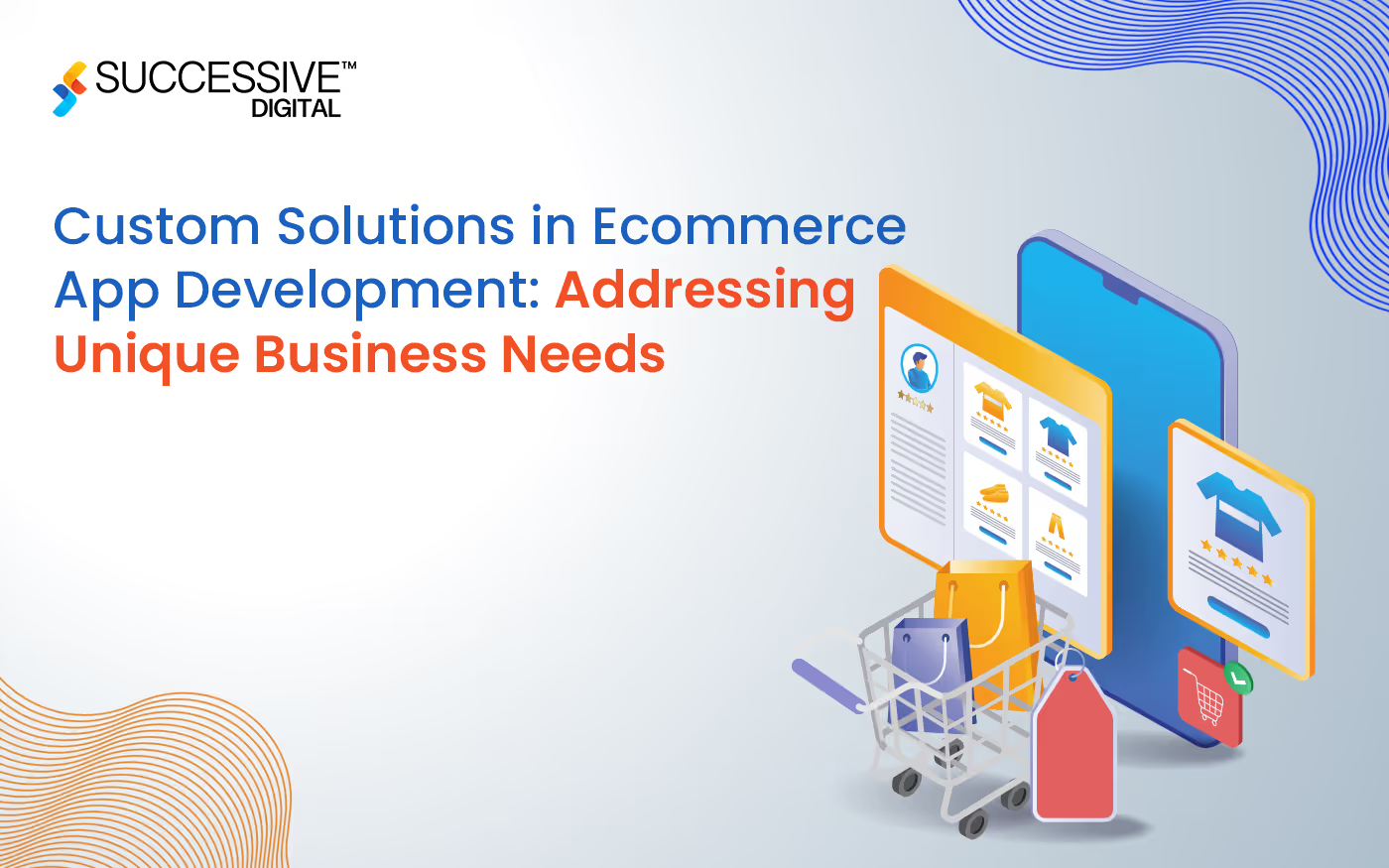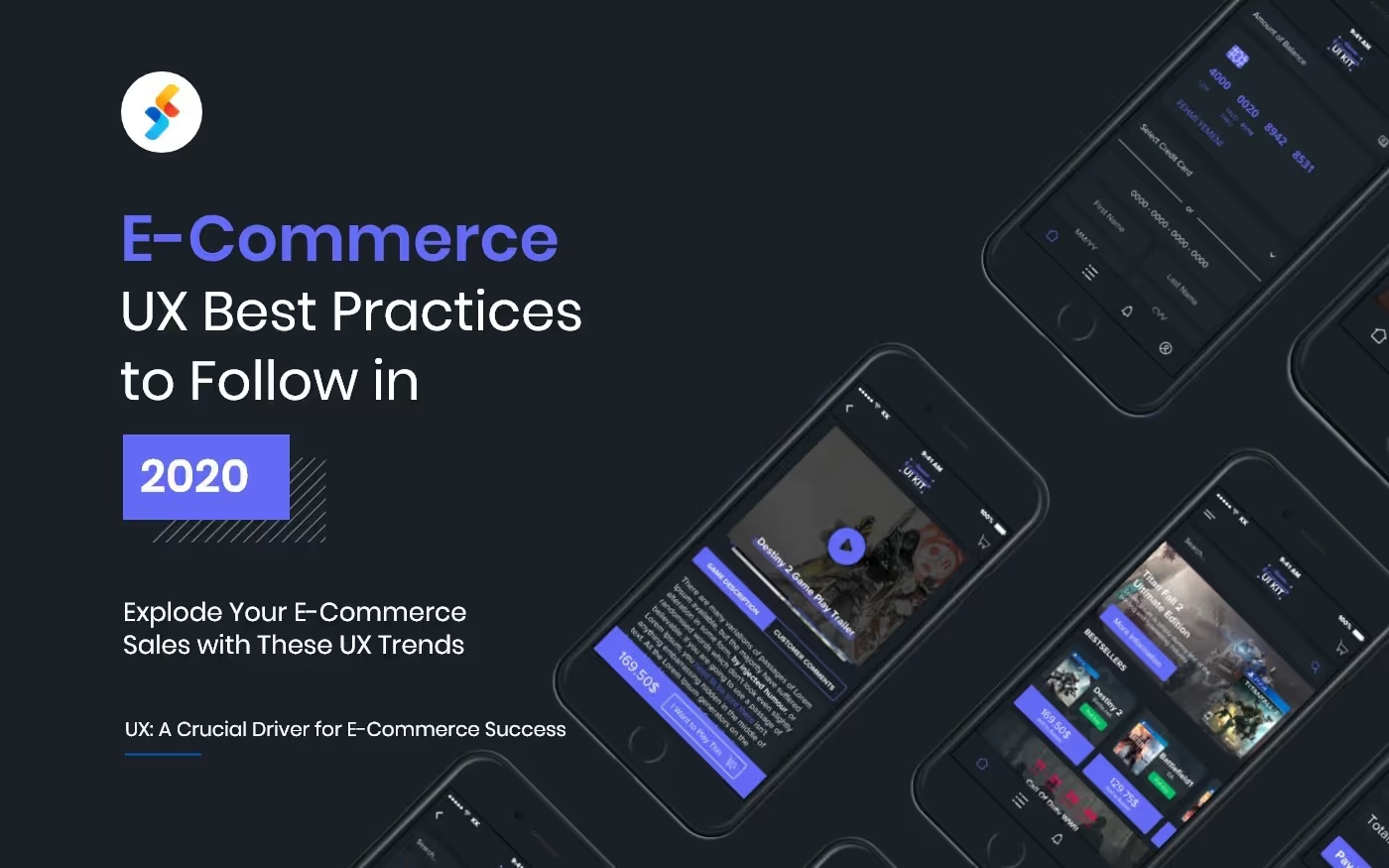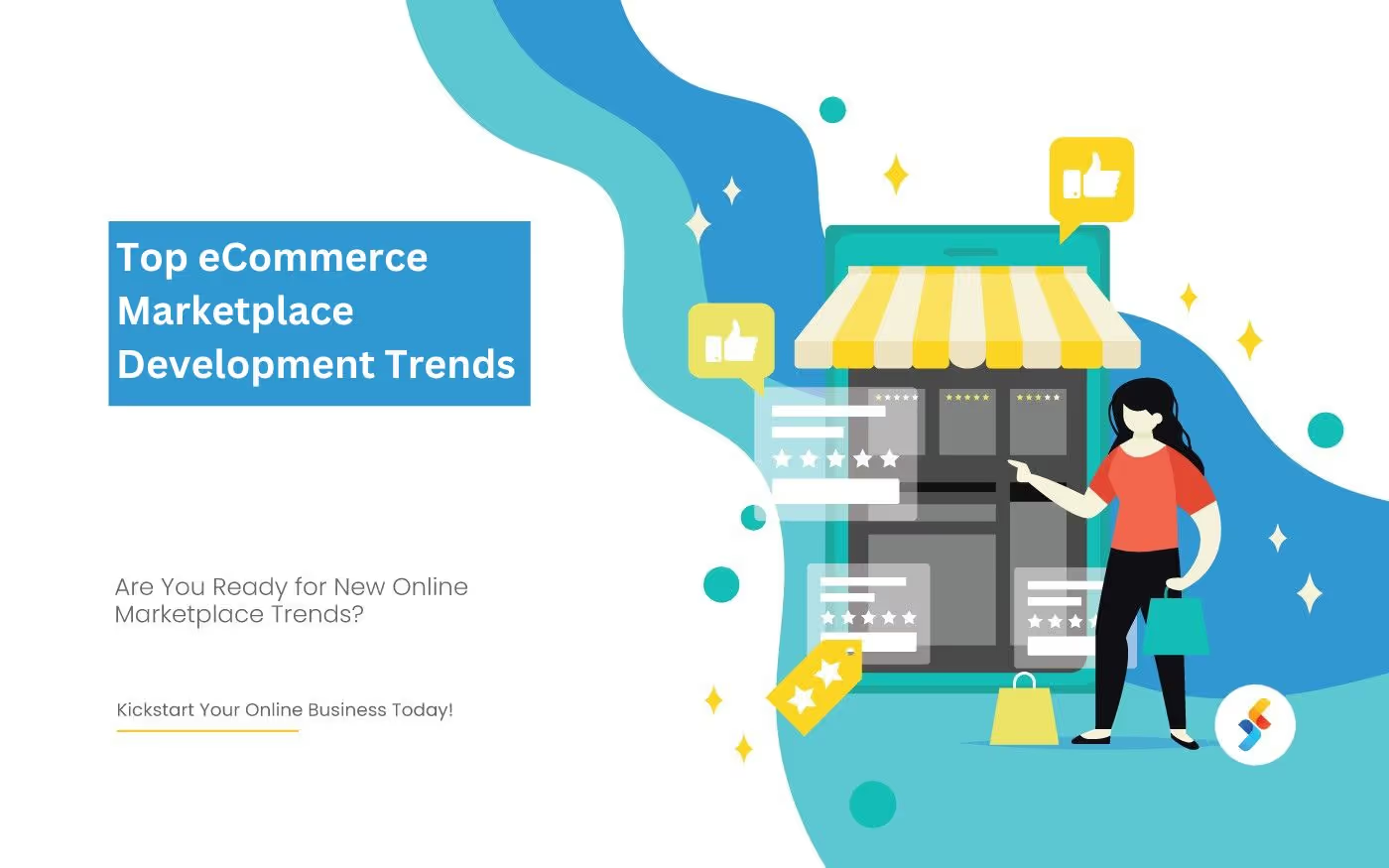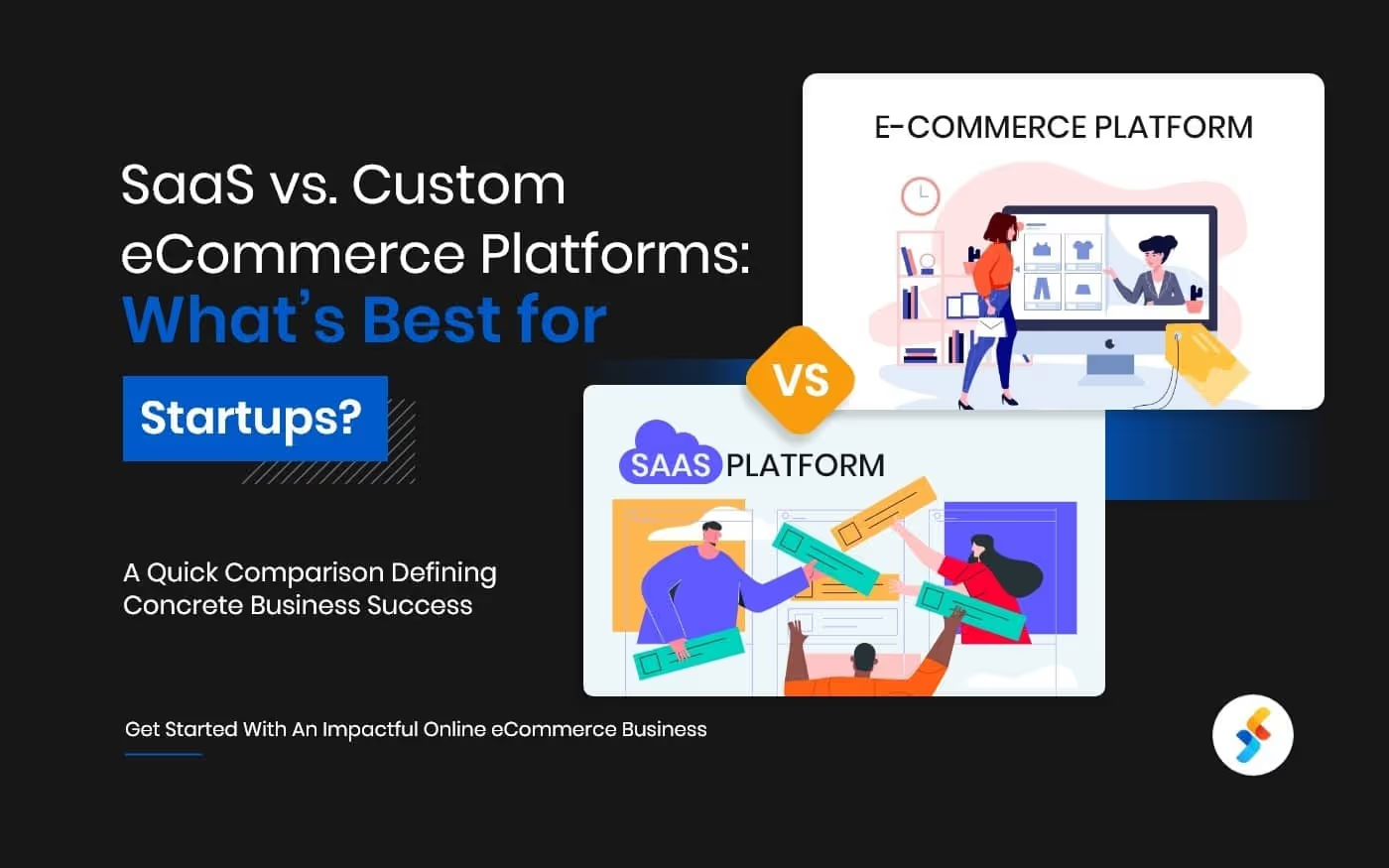In 2024, businesses in electronic commerce will succeed only if they entirely switch to facilitating connected commerce experience for all stakeholders, including buyers, sellers, and others. Today's time is all about "mobile is life - life is mobile." Henceforth, businesses need to have a deep online presence to support the connected behavior of today's customers.What we mean here with connected behavior of customers is that it’s not just the buyers looking for a connected or context-correct engagement experience with the brand, but the sellers and supportive resources also require the same support to assist the buyers for end-to-end brand engagement, transaction processing, and after-sales support. Custom eCommerce solutions here support potential buyers and other stakeholders in their journey across channels without losing context.In this blog post, we will walk you through the significance of custom eCommerce solutions and how these help enable business-specific workflows.
What is a Custom eCommerce Solution?
The eCommerce transactions typically fall within four business categories: business-to-business (B2B), business-to-consumer (B2C), consumer-to-consumer, or consumer-to-business. The difference between these platforms is the difference in requirements of the buyer on one platform from the other platform. The same difference applied to sellers as well. Therefore, the business workflow of one platform varies drastically from the other, as does the user journey.On top of it, businesses dealing within the same category often have different offerings or business concepts than others. It made the brand experience of one business different from the other and required to be reflected and in sync with its online platforms no matter what platform the user chooses to engage with the brand and at what stage he/she is on its buying journey; be it retail store, online web store, mobile store, social commerce, pre-sales, sales, or after sales engagement platforms.A custom eCommerce solution here helps as it addresses those unique workflows and business requirements and streamlines it with the backend processes. It also establishes a connected commerce experience or connected software experience. Many customizations are performed to meet the unique workflow of a business so that a business can have functionalities that boost customer satisfaction and sales. Tailored app development practices are used to customize eCommerce features and functionalities based on unique business workflows.
Types Of Custom eCommerce Solutions A Business Uses
In order to deliver a truly connected customer experience, it is clear that all enterprise functions and systems need to be connected. To facilitate internet-based commerce experience, companies of sizes usually have different frontends and backend processes known as SKUs, ERPs, CRMs, EHRs, SCMs, Payment Gateways, and others that collaboratively support different business operations such as IT, Marketing, Sales, Administration, and other. Let's discuss a few custom eCommerce Application solutions crucial for true eCommerce enablement.
1. SKUs (Stock Keeping Units) Optimization
The significance of Stock Keeping Units (SKUs) cannot be overstated, especially for retailers operating both online and offline. A business-specific eCommerce app tailored to adept SKU management holds the key to enhanced tracking, seamless organization, and heightened operational efficiency.The ability to customize SKUs ensures that products are meticulously categorized, facilitating precise monitoring across diverse platforms. This not only streamlines inventory control but also enables retailers to maintain optimal stock levels, preventing overstock or stockouts.Moreover, a bespoke SKU system enhances product visibility by offering unique identifiers, fostering a more engaging and efficient customer experience. The result is a harmonized approach to online and offline retail, where SKU customization becomes a catalyst for improved sales through strategic inventory management and enhanced customer satisfaction.
2. Transaction Enhancement
Within the eCommerce ecosystem, transactions play a pivotal role, serving as the backbone of customer interactions. Transaction enhancement through custom features is paramount for fostering a seamless and secure digital shopping experience. A tailored app development approach includes the implementation of secure payment gateways, ensuring financial transactions are safeguarded.Additionally, features like real-time transaction processing and order tracking contribute to heightened user satisfaction. Case studies exemplify the transformative impact of these customized functionalities, showcasing how they not only elevate user trust but also significantly enhance overall satisfaction levels.By prioritizing transaction enhancement, businesses can establish themselves as reliable and user-centric entities in the competitive e-commerce landscape, thereby fostering lasting customer relationships and securing a prominent standing in the market.
3. Marketing Functionality Tailoring
Generic marketing approaches often fall short of addressing the unique challenges faced by businesses. Tailoring marketing functionalities through a custom app becomes imperative to navigate these challenges successfully. The integration of personalized marketing strategies, such as targeted promotions, loyalty programs, and dynamic content, enables businesses to engage with their audience on a more individualized level.This approach not only fosters customer loyalty but also enhances overall satisfaction. Real-world examples vividly illustrate the effectiveness of such customized marketing functionalities, showcasing how they contribute to heightened customer engagement and long-term retention.By embracing tailored marketing strategies, businesses can transcend the limitations of one-size-fits-all approaches, creating a more resonant connection with their audience and ultimately driving sustained success in the competitive eCommerce landscape.
4. Operational Software Integrations [ ERPs, CRMs, EHRs, SCMs ]
Operational software, including ERPs, CRMs, EHRs, and SCMs, plays a pivotal role in ensuring smooth business operations. An overview of these essential tools establishes their significance in managing diverse aspects of an e-commerce venture.Integrating these software enhances operational efficiency by streamlining processes, automating tasks, and centralizing data management. Case studies provide tangible evidence of successful implementations, illustrating how integrated systems contribute to improved business efficiency.Whether it's optimizing inventory with ERPs, enhancing customer relations through CRMs, ensuring compliance with EHRs, or streamlining supply chains with SCMs, the tailored integration of operational software proves instrumental in elevating overall performance and maintaining a competitive edge in the ever-evolving eCommerce landscape.
How Does A Custom Software Solution Help An eCommerce Business?
Business-specific eCommerce apps allow stakeholders to leverage different features and functionalities built within the software to perform their day-to-day business operations-related jobs. Based on their specific business enablement requirements, these solutions are designed with functionalities to behave as the user wants. Let’s check how a custom eCommerce solution helps different stakeholders within a business in day-to-day life.
Administrators/Managers:
Whether it’s ERPs, CRMs, EHRs, or SCM, customizing these solutions supports the unique business workflow supporting the business strategy and requirements. For example, developing a data lake and enabling all participating systems to dump their customer-centric data onto this data lake not only allows to run AI/ML analytics on it but the system can also be used by administrators or managers to perform user segmentation and cross channel planning. Based on business strategy, administrators or managers can leverage dashboards and analytics tools to make informed decisions based on key performance indicators.
Suppliers
Customizing supply chain systems allows suppliers to receive real-time updates on inventory levels, demand forecasts, and order statuses. Automated processes streamline communication between eCommerce businesses and suppliers, ensuring timely deliveries and reducing stockouts.
Warehouse and Logistics Staff
Tailored inventory management features help warehouse staff in efficiently tracking and managing stock levels. Integration of customized tools with warehouse and logistics systems provides real-time shipment tracking, optimizing the movement of goods and reducing delays.
Customer Support Team
Developing business-specific ticketing and communication modules enable customer support teams to address queries and concerns promptly. Access to customer order history and preferences aids in providing personalized support.
Marketing Team
Enabling customized features for a business-specific customer data analytics application empowers the marketing team to tailor campaigns based on customer behavior and preferences. Customizing marketing automation tools ensures targeted and effective promotional activities.
Finance Department
Financial modules, when customized to meet the business's unique workflow, assist the finance department in managing transactions, invoicing, and financial reporting according to the brand's proposition. Enabling customization within accounting systems ensures accurate and up-to-date financial records.
IT Department
Custom eCommerce apps developed with a focus on security and scalability align with IT standards, reducing the risk of data breaches. Automation of routine IT tasks through the app streamlines maintenance and updates, ensuring a stable and secure ecommerce environment.
Legal and Compliance Teams
Every business has to adopt a few legal and compliance guidelines. Besides that, companies also put in place some internal policies and regulations with which stakeholders need to abide by. Some groups or committees are also set up within organizations that regulate the guidelines and ensure operations are conducted as per the business policies. To support the initiatives, custom apps are designed, be it for the customer support service or business collaboration services; compliance tracking features within a custom eCommerce app help legal teams ensure that the ecommerce business adheres to relevant laws and regulations. Document management modules aid in maintaining a record of contracts and legal agreements.Also read -Impact of Generative AI-Based Shopping Assistant Chatbots in eCommerce
How do Business-Specific Ecommerce Apps Enable Businesses to Differentiate Themselves From Competitors?
Custom apps or business-specific eCommerce apps are created for a particular organization’s users to cater to their organizational needs. For example, a travel & hospitality provider only accommodates travelers to their properties who have subscribed to their membership plan. Though the membership plan can be of different levels or could have different sets of specifications, these properties will be visible to the one who is a subscribed member and allowed to make online bookings based on their subscription plan. As the company has a different business concept or plan for different user-segments, its website, portal, backend, and other systems will function differently to the ones such as Expedia, Thrillophilia, and others.This way, tailored app development and developed solutions only accommodate and support the specific needs, requirements, and workflows of the mentioned business concept. There are other advantages too of business specific eCommerce apps that help companies differentiate themselves from their competitors. Let’s check them.
- Customization: The app is tailored to the specific products, services, and business model of the eCommerce transaction. It may include features that are unique to the industry or the business's particular niche. Besides the backend workflow, a custom solution allows to change the UI/UX of the website to make it engaging for users irrespective of the platform they use to connect with the business.
- Integration: Delivering an omnichannel experience is not successful unless a user experiences true connectivity within each platform and can begin the journey with the brand irrespective of the platform he begins with or ends with. To facilitate such a level of user interaction, a tailored app development process allows apps to be integrated with the existing systems and processes within the organization. This may include integration with inventory management systems, CRM (Customer Relationship Management) software, order fulfillment systems, and more.
- Scalability: Over time, the business grows, and applications are required to support the scaling needs. When an app is developed through custom methods, a business CTO gets complete freedom to choose the app tech stack to get it developed and scale up and scale down as and when required. An app like this accommodates an increasing number of products, users, and transactions without compromising performance.
- Brand Alignment: The app reflects the branding elements, visual identity, and overall ethos of the business. Through a custom app, this alignment can be controlled, changed, and enhanced to maintain brand consistency and provide a seamless experience for customers.
- Workflow Optimization: You develop the app to support electronic transactions. A custom app development approach allows you to develop an app that you can use to streamline and optimize the specific operational workflows of your ecommerce business. This may include order processing, inventory management, and customer support functionalities.
- Data Security and Compliance: Business-specific ecommerce apps prioritize data security and compliance with industry regulations. This is especially important when handling sensitive customer information and financial transactions.
- User Experience (UX): The tailored app developed allows to design apps with the end-users in mind, offering a user-friendly interface that aligns with the preferences and expectations of the target audience. This includes considerations for mobile responsiveness and accessibility.
- Analytics and Reporting: Going through a custom app development process, you can develop an analytics and reporting application with advanced analytics and reporting features. As it will be customized, you can integrate it with existing eCommerce solutions and leverage it to collect valuable insights into customer behavior, sales trends, and overall performance.
- Flexibility: Business-specific custom eCommerce apps are flexible enough to adapt to changes in the business environment. This flexibility allows for the addition of new features, adjustments to workflows, and the incorporation of emerging technologies.
Success Story: Educational Material RetailerAs time and technology have evolved, mobile presence has become crucial for business success. One of the leading educational material retailers in the US realized it when COVID-19 happened. They have shops across the US, but the lockdown made them available online, especially on mobile devices, for a better and easier shopping experience for existing and new users.When they collaborated with Successive Digital, the path they needed to adopt was to set up the integration of the mCommerce experience. Successive Digital helped the client build a full-fledged user-focused mobile application, including multiple integration support to optimize their marketing efforts. The app was developed for both iOS and Android devices to provide a more optimized and personalized shopping experience. Successive also helped them align all the existing web integrations with the mobile app to create a seamless omnichannel ecosystem to enable visitors to browse product catalogs, create wish lists, add items to a cart, and easily complete purchases.Outcome
- Increased sales and customer loyalty developed
- Custom development enabled them to adapt to additional features easily
- A connected commerce experience is ensured through synchronizing data flow between the web and mobile for a truly connected buying experience.
Security Enablement
As the company has existed in the market for more than 3 decades, going to online commerce was not an easy decision to make for the retailer. They were storing the personal information of the buyers, such as name, address, mobile number, and transaction details. Therefore, they wanted to ensure robust security for using the application. Successive Digital performed end-to-end penetrating texting, checked through servers, networks, infrastructure, and applications, and ensured an efficient and secure operational experience for the educational material retailer.Also read -How Much Does An eCommerce App Development Cost?
Conclusion
Embracing custom eCommerce solutions is not just a technological choice but a strategic move for businesses seeking a competitive edge in the dynamic eCommerce landscape of 2024 and beyond. Companies who have not moved to digital experience initiatives need to think about it now, as digitizing every aspect of their business is crucial, and connecting them is even more crucial to leverage every opportunity to stay competitive and connected with potential customers.
.avif)



.webp)






.jpg)









